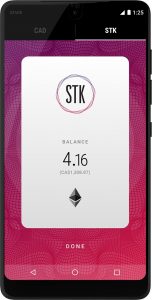With Bitcoin trading at $4,300 and Ethereum at $300, most of the attention in the payments world has been on the cryptocurrencies’ value as an investment rather than as a payment method. Now, a year-old Toronto-based startup hopes to change that by enabling contactless point-of-sale transactions using Ether, the Ethereum blockchain’s native currency, and later Bitcoin.
The 14-person company, known as Stack, says it has a waiting list of some 20,000 persons interested in using its mobile wallet, which stores a digital prepaid Mastercard as well as a token representing the owner’s Ether holdings. The company is running a private beta with an undisclosed number of users and plans to launch commercially in Canada by year’s end, with the U.S. market to follow in 2018.

The idea is to make it as easy to spend Ether as it is to use a credit or debit card, Stack cofounder and chief executive Miro Pavletic tells Digital Transactions News. “There’s a lack of acceptance of cryptocurrency at retail locations. We wanted to have that seamless access to currency no matter where it is,” he says. “You should be able to access it any time, spend it any time.”
Stack’s twist is that its wallet interacts with contactless terminals, making it a sort of Apple Pay for digital currency. Some 80% of POS terminals in Canada now have contactless capability, Pavletic estimates. To make the transaction work, Stack relies on something called the STK Token, which represents the user’s Ether. The token opens a channel that records the transaction for real-time authorization and settlement, writing it to the blockchain later. In this way, the wallet avoids growing congestion, which has plagued Bitcoin and is starting to affect other digital currencies. “It’s becoming a problem on the Ethereum chain, too,” says Pavletic. Merchants are paid in their local currency.
If Stack can get its wallet into enough hands, it has a fighting chance to solve a major problem for digital currency, experts say. “They’ve developed a process to convert cryptocurrency to fiat currency in real-time at the point of sale through a mobile wallet. Theoretically this would dramatically reduce the friction involved in buying stuff with cryptocurrency and could potentially open the doors to more transaction volume using cryptocurrency,” notes Thad Peterson, a senior analyst at Boston-based consultancy Aite Group LLC, in an email message.
But Stack’s ambitions don’t stop with making digital currency a mainstream payment method. A former banker at CIBC and Toronto Dominion, Pavletic says the company’s app is really a “digital account,” replacing many of the consumer’s typical banking relationships.
Backed by a bank Pavletic won’t name, the Stack account offers such services as ATM access via a plastic prepaid Mastercard, merchant rewards, automated transfers to savings, and foreign exchange. The account itself carries no fees, Pavletic says. Instead, Stack earns its revenue by taking a portion of interchange and currency-conversion fees. “We wanted to create alternative revenue streams so we could eliminate fees on the account,” says Pavletic, who points to consumer frustration with bank fees. “There’s always an opportunity to come in and shake things up where there’s no competition.”
Still, as promising as the contactless POS approach may be for Ether and ultimately Bitcoin, experts like Peterson caution against expecting fast results. “It is very early days and a lot needs to happen before this scales to anything approaching traditional tender-type volumes,” he says.





